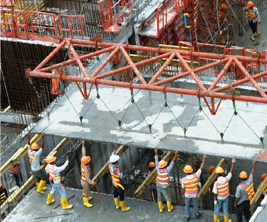Abright, sunny new year rolled in a month ago. While January 1st is just another day, it holds prom- ise for countries and people alike. In coun- tries like Myanmar, 3 million who set foot on its soils in 2014, remained awestruck at its untouched natural beauty, the warmth and simplicity of its people, and the rapid- ly changing urban façade. Unlike any other country today, tourists do wish time and change would halt, so that the country re- tains its ethereal charm. For Myanmar folk, however, change is not fast enough. They wish the pace of development would acceler- ate, so that their country can soon offer them the material comforts and job opportunities that come with growth and development. Myanmar today shows hope and promise of change, transformation, growth and devel- opment. For every resident, 2015 is set to bring in decisive change, with elections that will hand over power to a democratically elected government. This political transfor- mation combined with economic advance- ment indicates a growth rate that cannot be matched by most developed nations. The Fi- nancial Times has rightfully called Myanmar the “lurking Asian tiger”.
Nearly every country is eyeing Myanmar’s growth potential and multinationals have
made inroads to explore and expand within the country’s boundaries. Their wish would be, ease of setting up business, availability of the requisite financial services, clear cut regulations and transparency.
The Locals’ wish list
Myanmar opened its doors to the world in 2012, and this has brought in goods, fa- cilities and services, which are taken for granted in most other countries. It may take a few years before all these reach in- ternational standards. The biggest problem is unequal and inadequate access to basic services and facilities besides limited live- lihood opportunities. The solution lies in accelerating the pace of reforms to bring about balanced growth.
Some of the things the local populace would wish for, in 2015 include:
- Better education- The literacy rate maybe high, but the quality of education in a country that once offered the best ed- ucation in Asia, has fallen drastically. The famed Yangon University, needs funds to be revived to reclaim some of its old glory, to provide highly qualified teachers, research facilities, and learning opportunities. Developing a course cur- riculum comparable to the world’s best institutes, is urgently required, though implementing it will be a challenge too. Access to the latest research papers and books is an essential duty of every in- stitute of higher learning. This will also prevent the exodus of students to neigh- boring countries.Efforts are on, to achieve this with active participation of countries like Canada, UK and Australia in the field of educa- tion. Small efforts by all the countries participating in Myanmar’s growth, can make a big difference. The results of such efforts are going to take time and it may be many years before Myanmar can claim to educate students of the same standard as most neighboring countries.
- Healthcare- Myanmar has been ranked 190th worldwide by the World Health Organization for its healthcare system. Access to genuine medicines rather than counterfeit drugs, advanced healthcare facilities, qualified doctors and treat ment, are still far behind neighboring countries. While there has been a dra- matic increase in government spending in this sector, it is still only 2% of GDP. Access to hospitals and doctors in the cities, towns and villages they reside in, rather than having to rush to Yangon and Mandalay for serious problems, makes the people fearful, and they wish, no one falls sick in this country.
- The government’s efforts are likely to take time to bear fruit, with their in- creased spending, foreign collaborations and setting up of international clinics, and encouraging private investment in the field. This wish is likely to be fulfilled in the next couple of years.
- Infrastructure- The need to develop infrastructure in Myanmar cannot be stressed enough. Transportation, com- munication, water and electricity, are all available to a limited section of the population in the bigger cities. The road network needs to expanded at the earli- est, since at present, there is only 6 ki- lometers of road per 100 square kilome- ters of land area. Billions of dollars need to be invested by the government or by foreign investors. The process has start- ed, since we see new roads and flyovers coming up in Yangon, better power sit- uation with relatively fewer power fail- ures, improved telecommunication with Telenor and Oredoo beginning services, and so on. These have yet to penetrate to smaller towns and villages, are eagerly awaited by the residents. The flip side of the modernization program is also be- coming painfully evident. As more vehi- cle imports were permitted, the number of vehicles on the roads has multiplied manifold, leading to traffic jams that cause delays. Even then, Myanmar has the lowest vehicle penetration in South East Asia. Infrastructure development, therefore, needs more coordinated plan- ning and implementation. The purpose being – to make life easier, not more dif- ficult.
- Capability building- Capacity building is being touted as the biggest need of the hour. I would prefer calling it ‘capabili- ty building’, since it is the capability of the locals that has to be built, so that they can participate in the process of in- dustrialization and modernization. The biggest challenge for international com- panies and organizations is finding qual- ified and capable local workers. Capabil- ity that needs to be built includes both language and technical skills. Foreign companies seem prepared to provide on the job training, but the basic skill and capability has to be developed first.
- Rural development- As one drives a few kilometers out of Yangon, all that meets the eye, is vast expanses of plain land, some cultivated, some barren and unu sed, with no concrete structures, ham- lets with a cluster of bamboo hutments, or small houses on stilts. Rural areas are lagging far behind towns and cities, and need more attention from the governing bodies. Rural areas are dominated by agriculture and related activities, which, may not let the rural poor, starve, but their lot is not likely to improve. The need is access to education, better healthcare, clean drinking water, roads and hygien- ic living conditions. The infrastructural needs of villages are far more than that of their urban counterparts.
The Foreigners’ wish list
There is perhaps no other country that is as enigmatically fascinating as Myanmar, for the world beyond its borders. The few thou- sands who have come to work here, do not wish to leave, despite the difficulties they face. They have had the unique experience of seeing a country transform into a democ- racy, and change that has only made life eas- ier for them as much as the locals.
The expatriates living in Myanmar, and the tourists would also like to see some chang- es in the country in the coming year. Their wish list would include the following:
ity that doesn’t quite justify the rentals demanded, most foreigners are disap- pointed, and cringe at the prospect of paying so much. Top on their wish list would be better housing facilities being available in 2015. This wish is on its way, with the construction of numerous high rise residential and office projects on the way, nearing completion towards the end of 2015 and early 2016.
- English skills- As of now, signboards are mainly in Myanmar language, and beyond the hospitality industry and the educated elite, too many people do not speak English. This makes communi- cation difficult, even though people are helpful. With a larger percentage of the populace conversing in English, tourists and expatriates living here, would find communication easier. This wish is like- ly to be fulfilled in the near future with more English speaking courses being of- fered and organizations offering to spon- sor English language lessons.
- Better living premises- Real estate pric- es have touched the sky, and rentals are comparable to the world’s most expen- sive cities, at least in Yangon. With quality that doesn’t quite justify the rentals demanded, most foreigners are disap- pointed, and cringe at the prospect of paying so much. Top on their wish list would be better housing facilities being available in 2015. This wish is on its way, with the construction of numerous high rise residential and office projects on the way, nearing completion towards the end of 2015 and early 2016.
- Better food hygiene standards- Hygiene standards have yet to pick up, and be- yond upscale restaurants, hygiene stan- dards leave a lot to be desired. Stomach ailments, food poisoning and digestive disorders are common. This is also due to non availability of clean water to wash utensils and cook, and improper storage of cooked food, which is left exposed to the elements in smaller food stalls. This issue is in the process of being ad- dressed, with private organizations un- dertaking to educate food vendors about hygiene and the need for cleanliness.
- Cashless travel- In the last two years, we have seen ATM machines come up, Western Union outlets and credit/debit cards being accepted in bigger restaurants and hotels. Most international tourists would love to see this network expand to facilitate cashless travel, and not having to carry wads of creaseless dollar notes to pay everywhere. As the banking sector improves this wish will come true too!
- Telecommunication and internet- Just a year ago, getting a SIM card was dif- ficult, and internet speed was slow. But with the launch of Telenor and Oredoo services, mobile networks have expand- ed and SIM cards easily available, not to mention MPT improving its services. However, poor voice quality, call drop- ping and inability to connect remain issues, and these are rather frustrating. We are told that with bandwidth being increased in the coming months, inter- net speed will improve.
The wish list can be endless, but we must not forget that Myanmar has come a long way since the country opened up. There is an improvement in every field, and it is so clear that the only way to go, is forward. The pace of reforms cannot backtrack or regress, and soon Myanmar will be an enviable destination.










